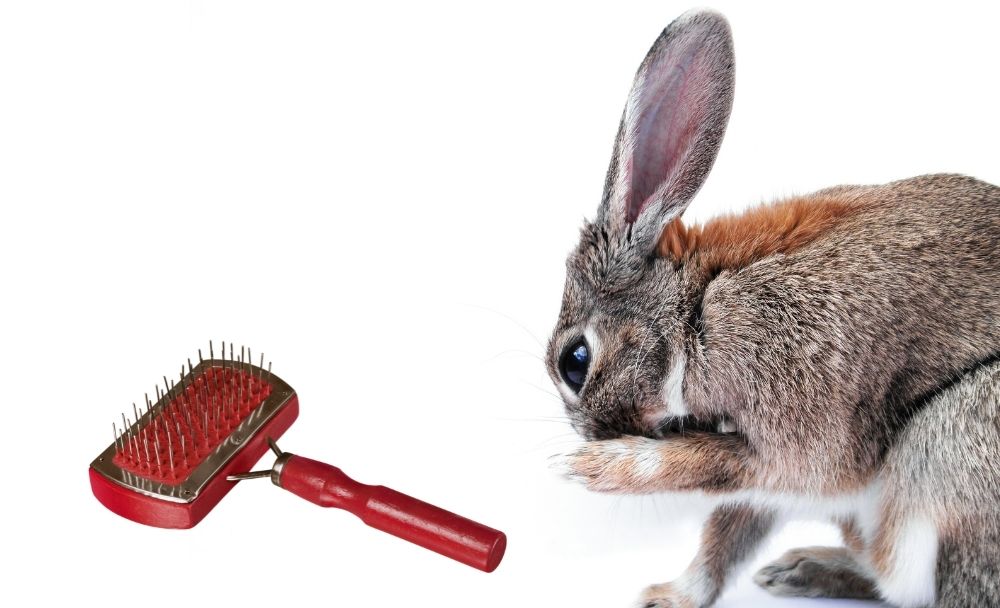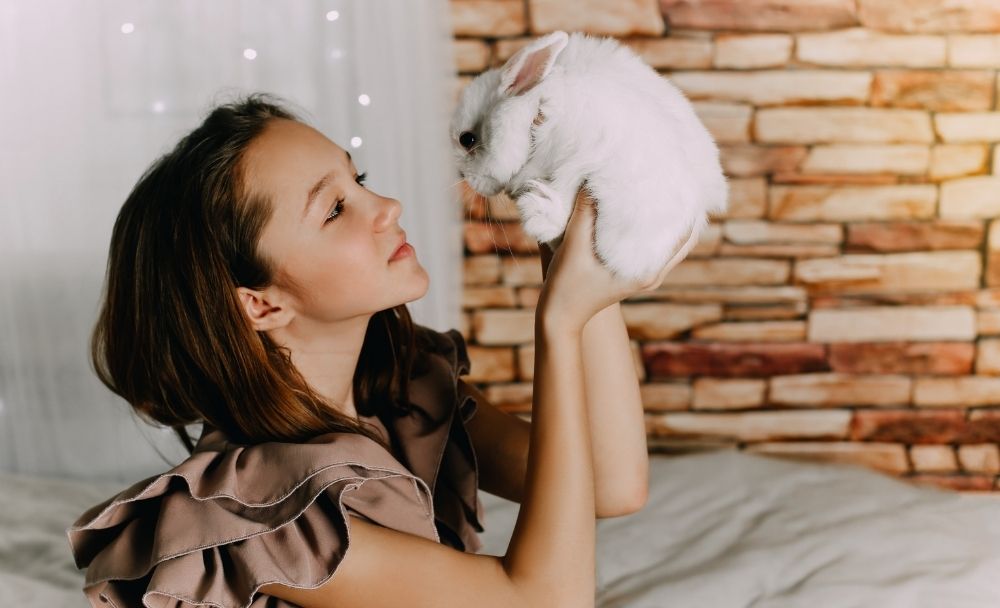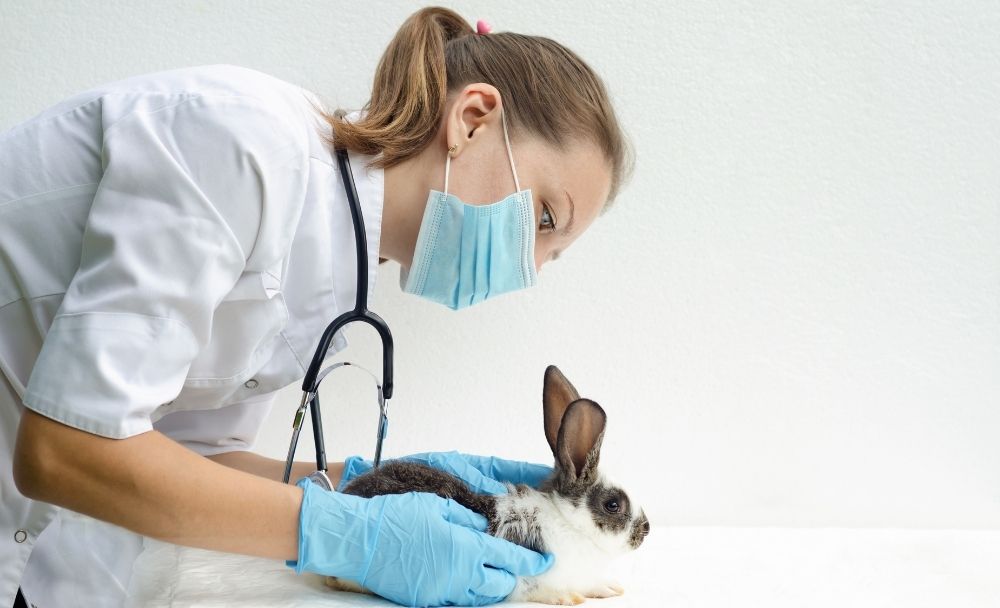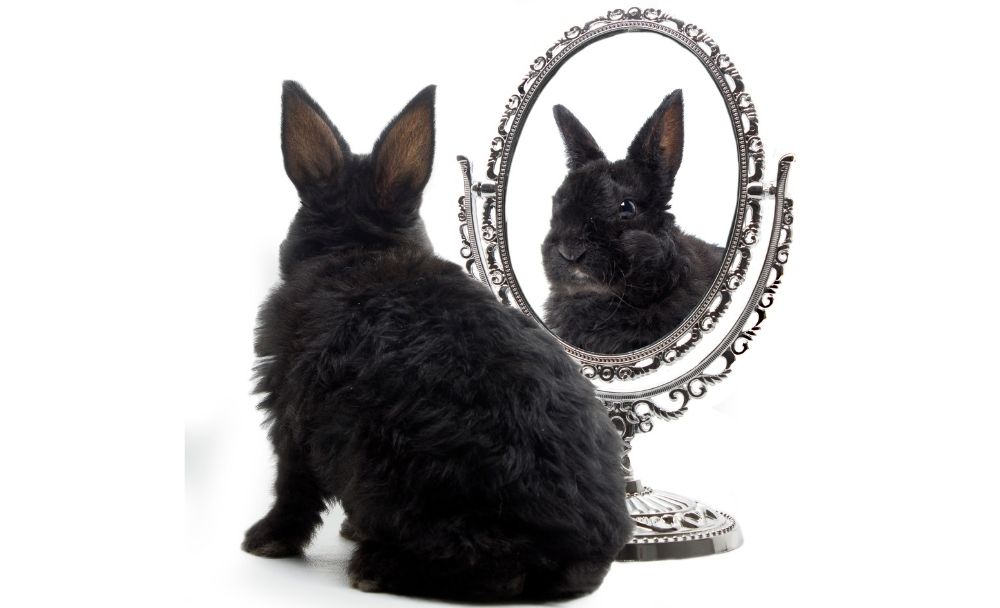Many never think that over grooming their rabbit can be a problem. However, as soon as you start to see your rabbit’s behavior change with your grooming patterns, you may want to give it some thought.
Rabbit over grooming can occur when you brush your rabbit too often, or when rabbits over groom themselves. This is usually a result of stress, boredom or self comforting. Excessive grooming poses a health concern for your rabbits skin and gut with the ingestion of too much fur.
Rabbit owners love grooming their little bundles of joy! It is a time when you can bond with your bunny and show them how much you care for them, and ensure they have that sleek coat of fur they deserve.
For many owners, grooming their rabbit grounds them. It reminds them that they can look after another living animal, one who loves them as much, if not more than the love given to them. Remember, rabbits are perfect mental/emotional health support animals.
It doesn’t matter what animal you own; it is human nature to take pride in them. Many pets are rescued or rehomed, giving them a second chance to live a good life. You are often their entire world, and a grooming routine can strengthen your connection.
In this article, I will discuss the basics of rabbits self grooming, rabbits grooming each other and when you may not realize you are over grooming your rabbit. Let’s get started:
How Many Time a Day Do Rabbits Clean Themselves?
Rabbits will generally clean themselves upon waking, after eating and multiple times throughout the day.
You need to consider quite a few factors when thinking of the optimal grooming routine for your rabbit. Some of these factors include whether your rabbits have short or long hair or whether they are in the process of shedding.
How Often Should Rabbits Be Groomed?
The amount of grooming your rabbit will require will depend on the type of coat they have. Typically, the rule of thumb is twice a week for short-haired rabbits and every day for long-haired rabbits. More than this can result in their hair thinning and falling out in clumps more readily.
Rabbit hair is very similar to dog hair in that they have their weather-specific coats. When entering summer, a rabbit will start shedding, meaning they may need that extra assistance to get the residual hairs off their body. Our beginners guide to rabbit grooming explains this further.
When you over groom your rabbit it can result in undue anxiety and stress for your bunny. Because the grooming happens so often, they do not get enough time to themselves. They are very much like introverted humans in this regard.
Believe it or not, rabbits are very independent animals! Imagine being bothered, held, and cleaned more than once a day. It would not only be uncomfortable, even for the extroverts, but it takes away from your independence.
What is Rabbit Rough Grooming?
Rough grooming tends to happen when rabbits are paired together and establishing dominance with each other. In unspayed females, you may notice she is rough with grooming her partner bunny at times when she is more hormonal.
Rough grooming should be controlled as soon as you see it happen. Separate the bunnies and pen them separately for some time out. Supervise playtime between your two rabbits to avoid any serious injury happening to either bunny.
How Do I Know if my Rabbit is Over Grooming?

Excessive grooming generally presents as irritated skin, scratch marks (such as behind the ears) thinning fur, or even worse, bald spots on your rabbit.
Remember, rabbits are responsible for most of their grooming practices. But unless you are familiar with the finer details of your rabbit’s grooming patterns, it is challenging to notice whether they are over-grooming by just monitoring their behavior.
Typically, rabbits that are either over-grooming themselves or are being over-groomed by their owner could display a degree of anxiety. If you find that your rabbit is always hiding, cowering, or running away, something is likely to be upsetting them. Simultaneously, rabbits under duress will attempt to make themselves feel better by self-grooming.
Usually, you will find that if your rabbit’s fur is falling out more than usual, you may be on the brink of over-grooming. Try tapering back on the grooming process and see if it improves. If it doesn’t, it may be best to make an appointment with your vet.
Remember that all rabbits are different, and even those of the same breed may require different grooming schedules. Finding out what this schedule is is part of the joy of owning a rabbit!
Why is my Rabbit Over Grooming?
There are many reasons why a rabbit may over-groom themselves. The self-grooming process for rabbits is comforting for them. Or they may find themselves stressed, bored, anxious, or even a bit sick. Rabbit over grooming can be caused by something as simple as lack of exercise.
In general, self-grooming can make a rabbit feel better.
The tricky part is when this anxiety is due to the owner’s grooming routine. Too much grooming can cause both stress and digestive discomfort to your rabbit. Not only will your rabbit try their best to keep calm, but you may find them being constipated or having bowel patterns that are far from their norm.
Nevertheless, regardless of the cause of rabbit over grooming, it needs to be investigated. Nobody wants their rabbit to be stressed out because, just like humans, it just isn’t healthy! As soon as you start noticing a change in your rabbit’s behavior, it is best to address any problems quickly.
Am I Over Grooming My Rabbit?

Over-grooming can occur in two ways. Either the owner brushes their rabbit far too often, or the rabbit can become self-obsessed with its grooming.
Signs of severe rabbit over grooming will be straightforward to notice. This behavior can lead to little bald patches presenting on their skin or thinning of the fur. There may even be a few associated scars and scratches in these areas.
These features of over-grooming can also occur when owners brush their rabbits too much. Yet, it is also vital to spend time with your rabbit when you groom them. So finding the right balance between sprucing up your bunny and the time dedicated to doing this is important. There is no golden rule to follow, and it will be up to you to determine the best grooming routine for your bunny.
It is also essential to know that a diagnosis of over-grooming does not necessarily mean that you intentionally meant to cause your rabbit some mischief. It implies the contrary because you have been trying to provide the best care possible for your rabbit.
If you are ever concerned about your rabbit over grooming habits, continue to advocate for your rabbit’s welfare and consult with your vet.
How to Stop a Rabbit From Over Grooming
Speaking with your veterinarian is the best way to know precisely how often you should be grooming your specific rabbit breed. A few good books also provide more in-depth information, should you want to go down that route (look out for our recommendations in our future article).
However, preventing over-grooming may not be as easy as it sounds. If you discover that your brushing technique could be why your rabbit feels the effects of over-grooming, then cutting down on the grooming is the best measure. That is the easy part.
But, this problem can escalate when your rabbit begins to over-groom. The following approach is rather methodical, but observe how your rabbit interacts with objects around the house, particular environments, other humans, and even other animals.
Many find that taking their rabbit outside in the early morning for a quick run in a secure area (while you drink your coffee!) allows them to explore safely. Your rabbit will sense your presence and feel reassured as you keep a sharp eye out for their welfare.
If you start to see your rabbit becoming skittish and always looking for the next noise, try altering the environment to make it more comfortable. Ensuring your rabbit remains calm means they will be less inclined to anxiously over-groom themselves.
If your rabbit is grooming out of boredom, it is time to create some fun activities for them. Believe it or not, rabbits love playing with small toys! Stack a few tiny plastic buckets or bricks, watch your rabbit knock them down and then build them up again (you, not the rabbit!).
This fun activity is one of the many methods of connecting with your rabbit. You can also check out our recommended toys for rabbits to help combat boredom.
How to Help a Rabbit Who Doesn’t Like Being Groomed

You must take into consideration your rabbit’s temperament when grooming them. For some rabbits, the grooming process can be a rather stressful one.
For rabbits that aren’t necessarily a fan of grooming, you must try your best to create positive associations with grooming. Whether using treats, a head rub, or gentle talking, doing this will help to decrease any stress they may feel.
Rabbits have their main pressure points at their lower back. By gently massaging this area, you are alleviating unnecessary grooming stress.
A significant consideration in the rabbit grooming process is the fur on their feet. Not that rabbits need furry feet to dance around or keep their paws toasty warm! But you need to ensure enough the hair on their feet is well maintained. It helps prevent irritation and damage to the delicate skin found beneath the fur.
Another tip is to avoid using stiff brushes when cleaning their ears and eyes. Yes, they may have a lot of debris present, but the stiff bristles cause trauma and damage to the thin membranes of their eyes and ears. You can only imagine the amount of discomfort this could cause. I know I wouldn’t be very welcoming of being brushed around my eyes or ears.
You can forget scissors near those areas too! Sometimes, it is more relatable to think about what we do not enjoy and then replicate that with rabbits.
When Should You Visit Your Veterinarian?

When rabbit over grooming occurs, it is more than just fur falling out. When hair starts to thin because of over-grooming in the same area, the skin can become inflamed. It may even deteriorate and cause a wound to form in some cases.
There are a few skin conditions that can mimic over-grooming. If you start noticing any signs of over-grooming, you should make an appointment for your rabbit to see your vet.
Your vet will assess your rabbit and may dispense anti-inflammatory cream or antibiotic medication to prevent or treat infections. You’ll also receive sound advice on how to take care of your rabbit’s condition.
Whenever a rabbit’s temperament and behavior change drastically, we always feel that it is grounds for a visit to the veterinarian. Rabbits enjoy routines, both within their physical and emotional spheres. Any shift from normality usually indicates something is wrong.
In Summary
Rabbits can undergo different types of over-grooming. The main two culprits are likely to be the rabbits’ or their owner’s grooming techniques. Both activities need monitoring when signs of rabbit over grooming are present. Other potential stressors need consideration as well. For instance, is your bunny experiencing anxiety? Could they be ill? If you have any concerns, please consult your vet.
There are other reasons why you shouldn’t go overboard and over-groom your rabbit. Although frequently brushing your rabbit to encourage a magnificent coat can be rewarding for you, too much can impact your rabbit’s overall sense of well-being. Furthermore, your rabbit should enjoy a gentle and balanced grooming routine instead of a rigorous brushing session.
Therefore, accustoming your rabbit to more tranquil grooming sessions can prevent the habits of self-soothe and over-grooming behavior. This routine can also facilitate the formation of a strong bond between you and your rabbit. Furthermore, it can better your rabbit’s temperament, meaning you can spend a more enjoyable time with your four-legged companion.
For many rabbits, the stress of the grooming process could be due to the brushes or other equipment in use. To illustrate this point, if you rely on a firm and rigid brush to groom your short-haired breed rabbit every day, we may have found the problem. Imagine raking a prickly bristle brush over fine hair; that must be uncomfortable!
When a rabbit associates pain with the grooming experience, they may try to avoid it altogether. The brushing technique used may also contribute to the thinning of your rabbit’s hair. So, making sure that your type of brush fits the breed of your rabbit cannot be over-emphasized. This is also important when giving your rabbit a dry bath.
To make grooming a task that both you and your rabbit enjoy, consider having all the necessary equipment on hand. Generally, you’ll need a slicker brush, fur splitter, and a wide-toothed comb to remove matted hair. A pair of nail clippers is also always a plus.
Rabbits are our life companions, and yes, sometimes we as owners may inadvertently make mistakes. But our rabbits are always there, and if you are lucky, may give you a little nudge or lick as if to say, “thank you for looking after me so well!”

